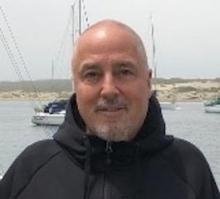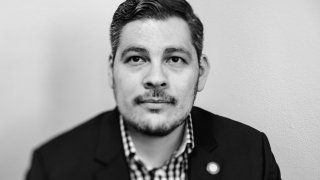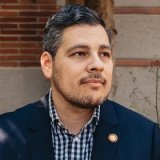Sometimes you don’t know the weight of something you’ve been carrying until you put it down. This was the case for Stephen Aguilar. When he heard that he finally earned tenure he said it felt as if he had been “carrying a heavy suitcase for six years and finally got to set it down.” Despite the challenge of carrying such a weight for so long, Aguilar appreciates the journey. He says he’s “stronger as a result,” and compares the effort to “training under weight.” Now that he’s dropped that suitcase, he’s nimble and able to produce research in more efficient ways.
Earning tenure is the culmination of Aguilar’s efforts since he was an undergraduate at Georgetown University, studying philosophy and psychology. From this early age, he always liked “the idea of producing and disseminating knowledge,” he says. He found his path to the study of education through his time in the classroom, where he continued to fuel his interests in philosophy and psychology in graduate school, at the University of Chicago and the University of Michigan, respectively. After wrapping up his MS in psychology at the University of Michigan, he continued his studies there, turning to the study of education itself, and completing his PhD in education and psychology. As a doctoral student, he was interested in student motivation and the use of gamification in the classroom to motivate students. He’s since continued this line of study, delving further into how educational technologies influence teaching, learning and motivation.
Since arriving at USC Rossier in 2016 as a Provost Postdoctoral Scholar, Aguilar has received numerous awards, including the Wilbert J. McKeachie Early Career Award for Motivation in Education Research and the AERA Division C Early Career Award. His research has been funded by the National Science Foundation, the American Educational Research Association (AERA), the Army Research Office and the National Institutes of Health.
One of his most recent major accomplishments was being named associate director of the USC Center for Generative AI and Society, where he leads research on how students and educators are using artificial intelligence in the classroom and the potential for these tools to change the way we learn and teach.
“This achievement is both hard-earned and well-deserved,” says USC Rossier Dean Pedro Noguera of Aguilar’s promotion. “Stephen juggles the demands of his profession admirably. He’s pursuing important and pioneering research in the field all the while serving as a faculty leader and teaching and mentoring the next generation of educators.”
Celebrating tenured Mexican American faculty
Aguilar’s milestone is not only a personal one, but also one for USC Rossier. Aguilar is the first Mexican-American faculty member to hold tenure since Professor Emeritus Robert Rueda was hired in 1986 and received tenure shortly thereafter.
Rueda had previously gained tenure at Arizona State University, so while the honor wasn’t new to him, it nonetheless was a monumental achievement and a “big weight off of my shoulders,” says Rueda, the former Stephen H. Crocker Professor of Education.
Rueda is the oldest of nine children and the first in his family to go to college. He completed his PhD work at UCLA, where he studied special education and educational psychology. Before earning his doctorate, Rueda studied psychology at UCLA where he earned his BA and completed his master's in psychiatric social work at USC.
Rueda’s research interests intersect with Aguilar’s in that he is also interested in student motivation, with a particular focus on English-language learners. Rueda’s accolades and contributions to the field of education are numerous. He’s a member of the National Academy of Education, a recent inductee of the Reading Hall of Fame and a fellow of the American Psychological Association and the American Educational Research Association (AERA).

Rueda recalls meeting Aguilar for the first time at an AERA conference where they connected over their shared interest in student motivation. Aguilar was wrapping up his doctoral work and looking for a position in academia. Rueda urged him to consider USC Rossier.
Rueda then and now stresses the qualities that set USC Rossier apart. Because the school is a private institution, he says it “can respond quickly [and there’s] the ability to do things you might not be able to do at other universities.” Compared to its public counterparts there is less bureaucracy and hoops to jump through when it comes to getting approval for new research and initiatives, Rueda says.
Aguilar’s experience has been the same. Despite the school’s size, “we’re very nimble,” he says. “If you come with a good idea, there’s not a lot of red tape to get from idea to pilot,” Aguilar says, citing the Center for Generative AI and Society. Aguilar wrote the proposal for the Center with Sinatra and Research Professor of Computer Science Bill Swartout, pitched the idea to the Provost’s office, and within a semester, the work was funded and underway.
Rueda also cites USC Rossier’s focus on urban education and the large numbers of clinical faculty who are able to be “much more responsive to local needs.” Aguilar also sees the school’s location in Los Angeles as one of its strengths. There’s the “potential to do a lot of good work in a dense urban setting,” Aguilar says.
Aguilar overlapped with Rueda briefly when he arrived at USC, but Aguilar credits Rueda for helping him to navigate USC and the profession. The two have remained in touch and Aguilar counts him as a mentor. Modestly, Rueda says that Aguilar will reach out to talk with him and “pretend like he needs advice.” Of Aguilar’s recent achievement, Rueda says that he’s “really proud of the progress he’s made. He’s very serious about his work and had a clear sense of what it took to achieve tenure.”
While Aguilar is certainly proud to join the good company of Rueda, achieving tenure as a Mexican American, Aguilar says, should be the norm rather than something we draw attention to. Los Angeles is home to one of the largest populations of Mexican Americans in the United States. Roughly 35% of those living in L.A. County identified themselves as Mexican American in the 2022 census. Despite this fact, there remains a significant absence of Mexican Americans and Latinos in general among the ranks of tenured faculty at universities in Los Angeles, including USC.
Rueda was among a handful of faculty of Latino descent who received tenure in the 90s. And while these numbers are improving with the likes of USC faculty like Stephen Aguilar, Natalia Molina and Juan De Lara, there’s still room for improvement.
“We’ve always been present [in Los Angeles],” Aguilar says. Mexican Americans, he says, have left their mark on L.A.’s culinary history and its culture. “That identity should be reflected at every level—government, academia—we should have multiple seats at the table.”
The importance of tenure
The concept of tenure—that is, the status granted to some educators that gives them protection from dismissal—is largely unique to academia. It’s one of the things that sets academia apart from the corporate world, according to Rueda. With tenure, “no one can tell you what to do or what to be interested in. It’s key to the free expression of ideas, especially at a research university.” Rueda says.
Rueda was first awarded tenure at the University of Arizona, and he describes it as a “huge relief” that allowed him to take “a longer-term view.” Aguilar views tenure similarly. “[Tenure] allows us to take risks, but it doesn’t have to be a big risk. It could be a risk of time. You can let ideas simmer, and not every idea has to be fruitful. Some can even be dead ends so long as they teach you something..” Before reaching tenure, Aguilar felt as if he was “on a 6-year sprint.”.”
This approach can lead to stifled academic freedom, whether it be because an idea is far ahead of its time or because an idea is going to take a long time to bear fruit. “Good science is slow,” Aguilar says. “Tenure lets us slow down.”
Tenure also allows faculty to give students more of a leading role in research. Aguilar explains that it also frees them up to have more time to serve on committees and be of service to the university, taking an active role in shared governance.
Despite the pressures of working toward tenure, Aguilar has been an active member of the USC community, sitting on a number of committees including co-chairing the Joint Provost/Academic Senate Committee on Teaching and Learning well as serving as a committee member of the Human Protection Council, Faculty Online Advisory Group and the Diversity, Equity, and Inclusion Committee Member.
Aguilar looks forward to continuing this work and being able to take a more active role in university governance. And, he’s already started: He was recently elected co-chair of the USC Rossier Faculty Council. This role will evolve, with Augilar taking the helm of the council as chair for a term that will begin in fall 2025 and end in spring 2027.
Life after tenure
Aguilar has enjoyed these last few months as a tenured professor. It’s given him a moment to put down his suitcase and catch his breath. But, of course, the work continues. He’s already thinking about and working on new projects and expanding current ones.
His shift has focused to generative AI, where he has a number of active projects examining how students respond to AI chatbots, and whether or not their use affects students’ writing. He is also interested to see if new generative AI technologies will shift students’ academic motivation.
Distinguished Professor Gale Sinatra, who co-leads work at the new Center and whom Aguilar counts as an important mentor says, "I am absolutely thrilled to see Dr. Aguilar receive tenure. This will allow him to extend his contributions in technology and learning and AI and education beyond his already meaningful impact.
He continues to teach in USC Rossier’s doctoral programs, which includes serving as a dissertation advisor for PhD students. He’s also in the early stages of shaping a certificate program for educators that will focus on edtech and generative AI.
Aguilar says that he is “honored to have earned tenure at a place like USC Rossier. We are at the cutting edge of education research, and USC Rosier faculty are committed to making sure that our work has a positive impact on the broader community.” He plans to continue building upon this legacy for as long as he can.





